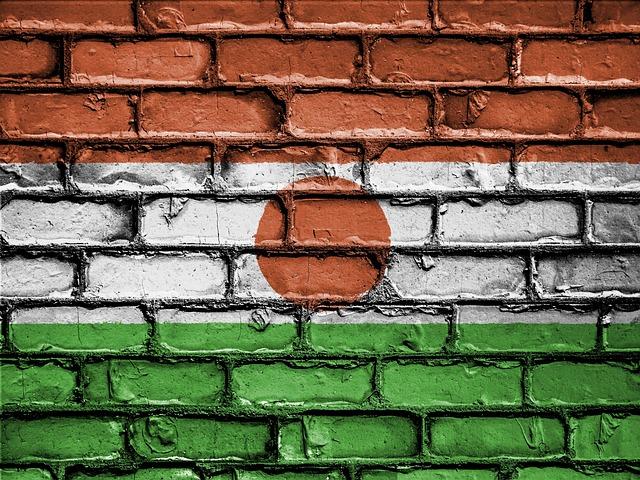In a meaningful shift in its military strategy in West Africa, the United States is facing an unexpected upheaval in its operations in Niger. The recent proclamation that U.S. forces will be expelled from the country marks a pivotal moment in american foreign policy, particularly concerning its counter-terrorism efforts in the Sahel region. Niger has long been viewed as a crucial partner in combating insurgent threats linked to groups such as Boko Haram and Al-qaeda in the Islamic Maghreb. However, growing anti-military sentiment among the local population and evolving geopolitical dynamics have led to increased tensions between the Nigerien government and the U.S. military presence. this article delves into the implications of this withdrawal, examining the broader context of U.S. engagements in Africa and the potential ramifications for regional stability and U.S.national security interests.
The Strategic Consequences of the U.S. Military Withdrawal from Niger

The recent withdrawal of U.S. military forces from Niger signals a seismic shift in the strategic landscape of West Africa, raising concerns about regional stability and the fight against terrorism. Wiht the U.S. having played a crucial role in counter-terrorism efforts through intelligence sharing and training local forces, the exit may embolden extremist groups operating in the Sahel. These groups, which include affiliates of Al-Qaeda and ISIS, could exploit the power vacuum left by the U.S. withdrawal, leading to an uptick in violence and destabilization in Niger and surrounding countries.
Moreover, this decision could have broader implications for U.S. foreign policy and alliances in the region. Countries that previously relied on U.S. support may seek alternative partnerships, potentially pivoting toward powers like Russia or China to fill the void.Key strategic consequences include:
- Increased influence of non-Western powers: The withdrawal may enable Russia and China to deepen their ties with local governments.
- Operational challenges for local forces: Without U.S. assistance, Nigerien and regional forces might struggle to effectively respond to insurgencies.
- Impact on humanitarian efforts: The rise in violence could hinder ongoing humanitarian programs and exacerbate instability.
| Strategic Factor | Potential Impact |
|---|---|
| Geopolitical Landscape | Shift toward Russian and Chinese influence |
| Security Dynamics | Higher rates of insurgent activity |
| Humanitarian Assistance | Increased challenges and needs |
Understanding the Regional Impact on Counterterrorism Efforts
The recent shift in U.S. military presence in Niger underscores the complex interplay between regional dynamics and counterterrorism strategies in the Sahel. As local political landscapes evolve, understanding the implications for counterterrorism efforts becomes crucial. The withdrawal of American forces not only affects operational capacity but also alters the dynamics between local governments and militant groups. Niger, historically a partner in the fight against terrorism, now finds itself at a crossroads were the balance of power may tip in favor of extremist organizations if governance and security measures falter.
Moreover, the ongoing economic and social challenges within the region exacerbate the threat posed by terrorism.The factors influencing this landscape include:
- Weak Governance: Political instability can lead to the erosion of trust between citizens and the state.
- Poverty and Unemployment: Economic difficulties create fertile ground for recruitment by extremist groups.
- Cross-Border Networks: The porous borders in the Sahel promote the movement of militants and resources.
To address these challenges, regional cooperation among nations, community engagement, and a thorough understanding of local grievances are essential. As foreign military support diminishes, it is indeed increasingly vital for Niger and its neighbors to develop localized strategies that incorporate both security and development to counter pervasive threats effectively.
Examining the Political Landscape and Domestic Reactions in Niger

Niger has become a focal point of geopolitical tension,particularly in the context of U.S. military presence in the region. In the wake of the recent coup, there has been a significant shift in the country’s political landscape. The new leadership has expressed a growing sentiment against foreign military involvement, particularly that of the United States, which has historically provided support in counter-terrorism efforts. This evolving dynamic has sparked domestic reactions among various segments of the population:
- Nationalism: A wave of nationalist sentiment has emerged, with many citizens viewing the withdrawal of foreign troops as a reclaiming of sovereignty.
- Concerns over Security: While some celebrate the closure of U.S. bases, others express fears about rising insecurity and the potential resurgence of extremist groups.
- Political Divide: Public opinion is sharply divided; some factions support the junta’s decision,while others advocate for alliance with the West to combat terrorism.
To understand the implications of these reactions, it’s essential to examine public sentiment before and after the political upheaval. The table below highlights key trends in Niger’s attitudes towards U.S. military involvement:
| Time Period | Public Support for U.S. Military | Nationalist Sentiment |
|---|---|---|
| Pre-Coup | 65% | 30% |
| Post-Coup | 30% | 60% |
This shifting landscape not only reflects the complexities of Niger’s political situation but also underscores the potential risks and opportunities that may arise from this transitional period. Observers are closely watching how these domestic reactions will shape future relations not just with the U.S., but with othre international players in the Sahel region.
Recommendations for U.S. Policy Reassessment and Future Engagement

The evolving political landscape in Niger necessitates a comprehensive reassessment of U.S. military engagement in the region. First,the U.S.must shift from a primarily military approach to a diplomatic strategy that emphasizes partnerships with regional leaders and supports democratic governance. Emphasizing humanitarian assistance and economic development could empower local communities and counteract extremist narratives. Additionally, redefining the U.S. presence to prioritize intelligence-sharing agreements and training programs can ensure that local security forces are better equipped to handle internal threats.
Moreover,a multi-faceted strategy should include an increased focus on collaboration with international partners,particularly within organizations such as the African Union and the Economic Community of West African States (ECOWAS). Establishing robust frameworks for joint operations and combined training initiatives can enhance regional stability. A proposed framework might include:
| Strategy | Focus Area |
|---|---|
| Diplomatic Engagement | Support democratic processes and political stability |
| Economic Development | Invest in local communities to deter extremism |
| Military Collaboration | Enhance training and intelligence sharing |
Implementing these recommendations can lead to a more sustainable approach that aligns U.S. interests with the aspirations of Nigerien people, providing an opportunity to foster long-term peace and security in the Sahel region.
The Role of International Partners in Filling the Security gap

The recent decision to withdraw U.S. military forces from Niger creates a significant security vacuum that international partners will need to address. In the absence of american troops, nations with strategic interests in West Africa must step up collaboration to mitigate the rising threats posed by extremist groups and regional instability. European nations,in particular,are well-positioned to enhance their role,as many have maintained military presences in the Sahel region. By fostering partnerships with local governments and investing in training and resources, these countries can bolster local armed forces and enhance surveillance capabilities, addressing the challenges that arise in the wake of U.S.military withdrawal.
additionally, regional alliances such as the Economic Community of West African States (ECOWAS) have a crucial part to play in stabilizing the area. These organizations should seek to engage in more comprehensive frameworks that promote security cooperation across borders. The following measures could be critical for success:
- Joint military exercises to improve interoperability among forces.
- Intelligence sharing to preempt and disrupt extremist activities.
- Humanitarian assistance programs that address the root causes of instability.
With collective efforts, international partners have the potential to fill the security gap left by the U.S. military, ensuring that the impacts of this transition do not lead to further chaos in the region.
Possible Pathways for Enhancing Stability in West Africa

As the geopolitical landscape in West Africa continues to evolve, identifying effective methods to enhance stability becomes imperative. One potential pathway is through regional collaboration, where neighboring countries unite to address common security challenges. Initiatives such as joint military exercises and intelligence sharing can build trust and reinforce capabilities in combating extremist threats. Furthermore, establishing regional institutions dedicated to conflict resolution, like the Economic Community of west African States (ECOWAS), can provide a framework for negotiation and peacekeeping, reducing the reliance on external military forces.
Additionally,investing in socioeconomic development is crucial for long-term stability.By focusing on education, job creation, and infrastructure development, countries can address the root causes of instability. Programs aimed at empowering youth and promoting entrepreneurship can deter them from joining extremist groups.A collaborative effort among governments,NGOs,and international partners is essential to ensure these programs are effectively implemented. To illustrate this concept, the table below outlines key areas of focus for enhancing stability:
| area of Focus | Objectives |
|---|---|
| Security Collaboration | Enhance intelligence sharing and joint operations. |
| Peacebuilding | Strengthen local mediation initiatives and community dialogues. |
| Economic Development | Promote youth employment and entrepreneurship initiatives. |
| Educational Programs | Invest in education to counter extremism and promote tolerance. |
The Conclusion
As the geopolitical landscape in West Africa continues to evolve, the U.S. military’s withdrawal from Niger marks a significant shift in american foreign policy and military strategy in the region. The decision reflects not only the changing dynamics of local governance and security partnerships but also highlights the complexities of international engagement in a rapidly shifting global order. As Niger grapples with its internal challenges,the implications of this withdrawal will reverberate beyond its borders,affecting regional stability and the broader fight against terrorism in the Sahel.
Moving forward, it will be crucial for policymakers to reassess their strategies and consider new approaches that prioritize collaboration with local entities while recognizing the areas where U.S. influence can remain effective.With other nations looking to fill the void left by the U.S., the future of security in Niger—and indeed, the entire Sahel region—remains uncertain. The lessons learned from this experience may well shape how the U.S. engages with other countries facing similar complexities in the years ahead. As we continue to monitor the situation, the eyes of the international community will undoubtedly be focused on how Niger navigates this pivotal transition and what it means for the region as a whole.







